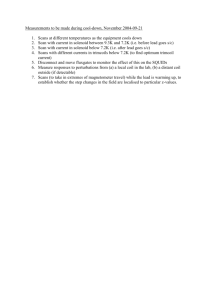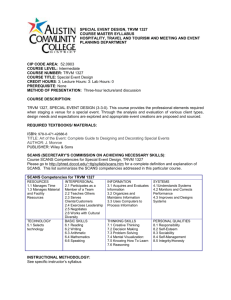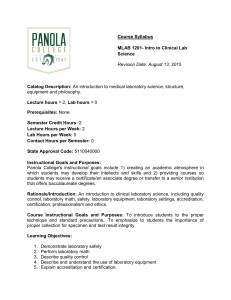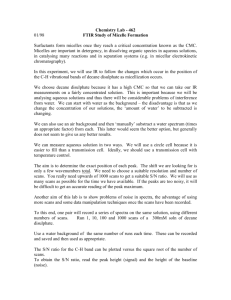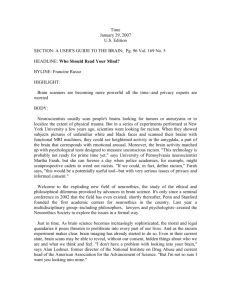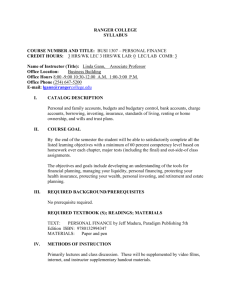Business Principles - ONLINE (BUSI 1301)
advertisement
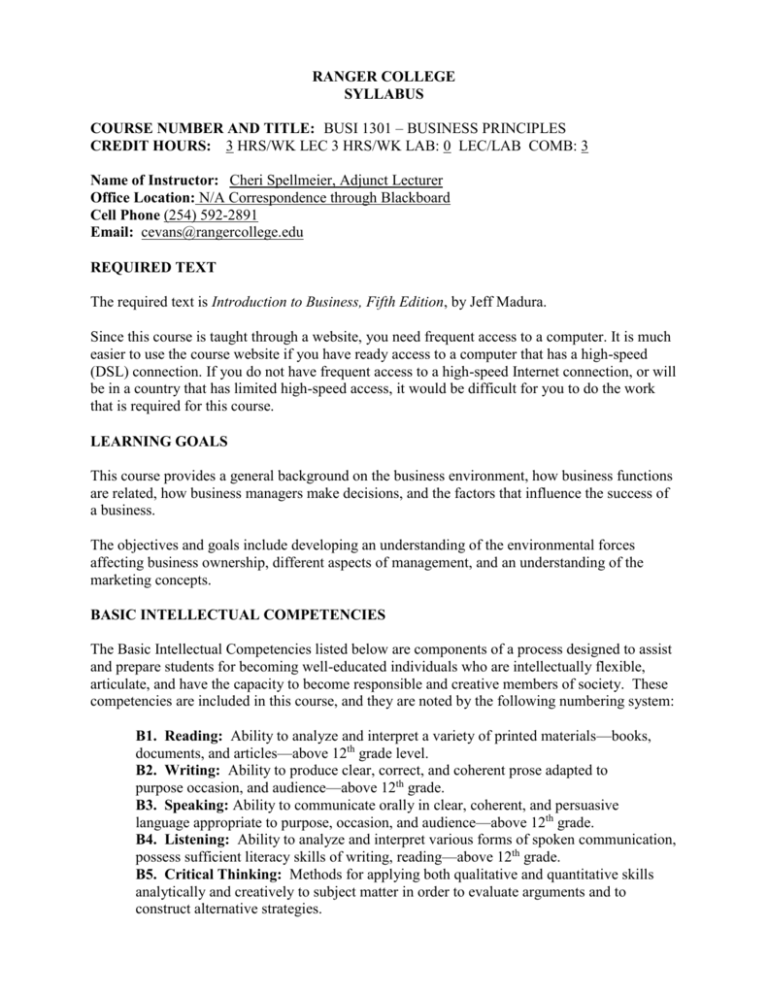
RANGER COLLEGE SYLLABUS COURSE NUMBER AND TITLE: BUSI 1301 – BUSINESS PRINCIPLES CREDIT HOURS: 3 HRS/WK LEC 3 HRS/WK LAB: 0 LEC/LAB COMB: 3 Name of Instructor: Cheri Spellmeier, Adjunct Lecturer Office Location: N/A Correspondence through Blackboard Cell Phone (254) 592-2891 Email: cevans@rangercollege.edu REQUIRED TEXT The required text is Introduction to Business, Fifth Edition, by Jeff Madura. Since this course is taught through a website, you need frequent access to a computer. It is much easier to use the course website if you have ready access to a computer that has a high-speed (DSL) connection. If you do not have frequent access to a high-speed Internet connection, or will be in a country that has limited high-speed access, it would be difficult for you to do the work that is required for this course. LEARNING GOALS This course provides a general background on the business environment, how business functions are related, how business managers make decisions, and the factors that influence the success of a business. The objectives and goals include developing an understanding of the environmental forces affecting business ownership, different aspects of management, and an understanding of the marketing concepts. BASIC INTELLECTUAL COMPETENCIES The Basic Intellectual Competencies listed below are components of a process designed to assist and prepare students for becoming well-educated individuals who are intellectually flexible, articulate, and have the capacity to become responsible and creative members of society. These competencies are included in this course, and they are noted by the following numbering system: B1. Reading: Ability to analyze and interpret a variety of printed materials—books, documents, and articles—above 12th grade level. B2. Writing: Ability to produce clear, correct, and coherent prose adapted to purpose occasion, and audience—above 12th grade. B3. Speaking: Ability to communicate orally in clear, coherent, and persuasive language appropriate to purpose, occasion, and audience—above 12th grade. B4. Listening: Ability to analyze and interpret various forms of spoken communication, possess sufficient literacy skills of writing, reading—above 12th grade. B5. Critical Thinking: Methods for applying both qualitative and quantitative skills analytically and creatively to subject matter in order to evaluate arguments and to construct alternative strategies. B6. Computer Literacy: Understand our technological society, use computer-based technology in communication, solving problems, acquiring information. SCANS COMPETENCEIES READING 1.1 Locate, understand, and interpret written information in text. WRITING 2.1 2.2 Communicate written thoughts, ideas, and information. Create documents written as application letters, resumes, and reports. INTERPERSONAL 5.4 Exercise leadership—Communicates ideas to justify position. Persuades and convinces others. Responsibility changes existing procedures and policies. INFORMATION 6.1 6.2 6.3 Acquires and evaluates information. Organizes and maintains information. Interprets and communicates information. SYSTEM 7.1 Understands Systems—Know how the business organizational system works-past, present, and future. THINKING SKILLS 9.1 9.2 9.3 9.6 Creative thinking Decision Making—Generates alternatives, considers risks and evaluates and chooses best alternatives. Problem Solving—Recognizes problems and devises and implements plans of action. Reasoning—Discover a rule of principle underlying the relationship between two or more objects and applies it when solving a problem. PERSONAL QUALITIES 10.5 Integrity/Honesty-Chooses ethical course of action. COURSE OBJECTIVE/LEARNER OUTCOMES: Upon completion of this instruction, the student will be able to: 1. Describe the relationships of social responsibility, ethics, and law in business and law and identify major functions in economics. (B1, B2, Scans 1, Scans 2, Scans 6, Scans 7, Scans 10) 2. Create a business plan. (B1, B2, B3, B5, B6, Scans 1, Scans 2, Scans 5, Scans 6, Scans 9) 3. Describe the organization of a business and the forms of business ownership. (B1, B2, Scans 1, Scans 2, Scans 6, Scans 7, Scans 10) 4. Define and apply steps to decision making.(B1, B2, Scans 1, Scans 2, Scans 6) 5. Identify major functions of management.(B1, B2, Scans 1, Scans 2, Scans 6) 6. Identify marketing techniques used on retail product advertisement. (B2, B5, B6, Scans 2, Scans 6, Scans 9) 7. Identify major functions of marketing.(B1, B2, Scans 1, Scans 2, Scans 6) COURSE SCHEDULE Week 1 Chapters 1 2 2 3 3 and 4 4 5 5 6 6 7 7 8 8 9 9 10 10 11 11 12 12 13 Topics Functions of a Business Syllabus Confirmation Email (see announcement) Discussion Board - Introduce Yourself Review Business Plan – Due in Week 13 Business Ethics and Social Responsibility; Read Chapter 1 & 2 Quiz - Chapter 1 & 2 Assessing Economic Conditions Assessing Global Conditions Discussion Board Selecting a Form of Business Ownership, Read Chapter 3, 4 & 5 Quiz - Chapter 3, 4 & 5 Entrepreneurship and Business Planning Discussion Board Managing Effectively, Read Chapter 6, 7 & 8 Quiz - Chapter 6, 7 Organizational Structure Midterm Exam - Chapter 1 - 8 (this test is online) Improving Productivity and Quality Discussion Board Motivating Employees, Read chapter 9 & 10 Quiz - Chapter 9 & 10 Hiring, Training, and Evaluating Employees Discussion Board Creating and Pricing Products, Read Chapter 11 & 12 Quiz - Chapter 11 & 12 Distributing Products Discussion Board, Week Chapters 13 14 14 15 15 16 and 17 16 Review Topics **Business Plan Due Promoting Products, Read Chapter 13 & 14 Quiz - Chapter 13 & 14 Accounting and Financial Analysis Discussion Board Financing Expanding the Business, Read Chapter 15, 16 & 17 Quiz - Chapter 15, 16 & 17 Final exam on Chapters 9-16 (This test is proctored) You will have to make an appointment to take this test at one of our campuses. **The above schedule and procedures in this course are subject to change in the event of extenuating circumstances. ASSIGNMENTS: You should read the assigned chapters each week. There are discussion questions and quizzes every other week. You should post an answer to the discussion board question and answer at least two people. To receive full credit for a response, it must be at least two sentences and add to the discussion of the topic. **The quizzes and midterm exam will open up Monday and be due by 10pm on Sunday of the week assigned. CLASS PARTICIPATION In an online course, class participation is important in that it can simulate the type of discussion that occurs in the class room. The comments posted in the Discussion Room during each week will be similar to what would have occurred in the classroom in that week. The following types of class participation count for credit toward the participation grade. DISCUSSION OF ASSIGNED QUESTIONS You should be answering all questions that were assigned each week. You should provide a constructive response that relates to the chapter material, current events, or personal experience to the discussion board question (by 10pm on Wednesday of the week assigned). To receive full credit for a response, it must be at least two sentences and add to the discussion of the topic. You should reply to at least two other people’s discussion (by 10pm on Sunday of the week assigned). You may ask a follow up question in response to another person’s discussion or add additional insight or personal experience. Simply stating, “I agree/disagree” without any explanation or restating what you wrote in your own post does not constitute an adequate post and will not earn you credit. EXAMS AND GRADING Syllabus Confirmation Email Quiz 7 @ 30 points each Discussion 7 @ 20 points each Response to Discussion 7 @ 6 points each Business Plan Midterm Final Total points available 8 210 140 42 100 200 300 1000 The following point scale will be applied for grading purposes: 900-1000 = A 800 - 899 = B 700-799 = C 600-699 = D Below 600 = F ACADEMIC HONESTY Cheating, plagiarism (submitting another person’s materials or ideas as one’s own), or doing work for another person who will receive academic credit are all‐impermissible. This includes the use of unauthorized books, notebooks, or other sources in order to secure or give help during an examination, the unauthorized copying of examinations, assignments, reports, or term papers, or the presentation of unacknowledged material as if it were the student’s own work. It is expected that all students will maintain high standards of personal and scholarly conduct. Students guilty of academic dishonesty will be reported to the Dean of Students and are subject to disciplinary action. Academic dishonesty includes, but is not limited to, cheating on exams or other academic work, plagiarism, the purchase or use of material prepared by someone other than yourself, collusion, and the abuse of equipment or resource materials. Disciplinary action may be taken beyond the academic discipline administered by the faculty member who teaches the course in which the cheating took place. ADA STATEMENT Ranger College provides a variety of services for the students with learning and/or physical disabilities. The student is responsible for making the initial contact with Ranger College Counselor. It is advisable to make this contact before or immediately after the semester begins. ADMISSIONS, EMPLOYMENT, AND PROGRAM POLICIES OF RANGER COLLEGE ARE NONDISCRIMINATORY IN REGARD TO RACE, CREED, COLOR, SEX, DISABILITY, AND NATIONAL ORIGIN
